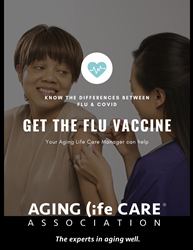
woman getting a vaccine
TUCSON, Ariz. (PRWEB)
November 10, 2020
After months of learning about and practicing social distancing, thorough hand-washing, and vigilant mask-wearing, Americans are equipped with the knowledge on how to stay safe amid the novel coronavirus COVID-19 pandemic.
The nation now braces for outbreaks in influenza (flu). With the onset of flu season, it’s important to understand how the flu is similar—and different—from COVID-19, and what older adults and those that care for them can do to protect themselves.
With Winter coming and cold weather increasing, Aging Life Care Managers can act as the (snow) boots on the ground to help older adults navigate the cold and flu season.
According to the Centers for Disease Control and Prevention (CDC), the flu and COVID-19 are both contagious respiratory illnesses, but they are caused by different viruses. They have many similarities and some important differences.
Since both have many similar symptoms, it may be hard to tell them apart. It is important to understand what features the two viruses have in common, and which are unique to each.
- Common to both: Fever or feeling feverish/chills, cough, fatigue (tiredness), sore throat, runny or stuffy nose, muscle pain or body aches, headache, or diarrhea and vomiting (more common in young children with influenza).
- For both viruses, symptoms can range from no symptoms (asymptomatic) to severe. It’s important to note that it is possible to spread the flu or COVID-19 when you are asymptomatic.
New onset of shortness of breath or difficulty breathing has been reported with COVID-19 infection. These symptoms also can occur with influenza infection but are usually seen among those with severe illness or other complications of influenza, such as pneumonia. New loss of taste or smell is also a symptom of COVID-19.
Aging Life Care Association Board President Liz Barlowe stated, “Aging Life Care Managers have been tending to their clients’ care before COVID and can be your “eyes and ears” to ensure a long-distance elderly loved one is safe.”
The best way to protect yourself against the flu is to get vaccinated. It is a simple step you can take to protect yourself, your loved ones, and others in the community. An Aging Life Care Professional can be essential in assuring an older family member gets their flu vaccine, to help prevent, or lessen the effects of, the flu.”
Barlowe continued, “And for many families that can’t be with their aging loved one due to COVID related reasons, working with an Aging Life Care Professional can be the lifeline needed to keep seniors healthy.”
With the fear of flu and COVID at the same time, social isolation among older adults is a serious concern. Introducing an Aging Life Care Manager into the care team adds someone to monitor both health and emotional well-being.
Combatting the flu virus alone is one thing but staying safe during the pandemic requires additional levels of precaution. Aging Life Care Professionals® will continue to serve as key supports, helping individuals and families ensure their elder loved one is as prepared as possible with vaccines and safe measures to avoid a flu or COVID-19 diagnosis. They take a holistic, client-centered approach to caring for older adults or others facing ongoing health challenges.
About the Aging Life Care Association®
Aging Life Care Association® was formed in 1985 to advance dignified, coordinated care for older adults in the United States. Founded by and handful of women entrepreneurs in the social work and nursing fields, the Association has grown to over 2000 members nationwide, who have cared for about two million older adults over its 35-year history. Members have extensive training and experience working with older adults, people with disabilities, and families who need assistance with caregiving issues. Members must meet stringent education, experience, and certification requirements. Members may be trained in any of number of fields related to long-term care, including nursing, social work, and other allied health professions with a specialized focus on issues related to aging. All members are required to adhere to a strict Code of Ethics and Standards of Practice. Aging Life Care™ and the role of care providers have captured a national spotlight with the onset of the global pandemic, and as generations of Baby Boomers age in the United States and abroad. For more information or to access a nationwide directory of Aging Life Care Professionals, please visit http://www.aginglifecare.org.
Share article on social media or email:

